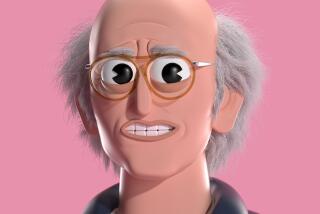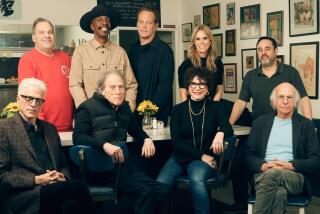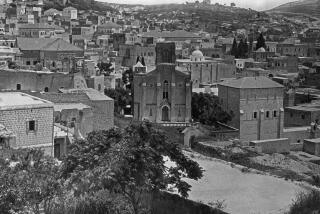Stereotypes of Arabs a TV Fixture : The age-old image of Arabs as swaggering sheiks lives on thanks to Clive James’ BBC series and CBS’ ‘Major Dad.’
- Share via
One of the ironies of “Fame in the 20th Century,” the thin but enjoyable BBC documentary series airing this week on PBS, is that the commodity it omits is exactly what host-writer Clive James has been supplying while hitting the TV interview circuit to promote these eight hours about the famous.
That commodity is interpretation--not just a listing of celebrities but some thoughts on why we’re attracted to famous people simply because they’re famous. James--an exceptional television critic during the decade he performed that task for two London newspapers--told interviewer Charlie Rose on PBS Monday night that, as a boy growing up in Australia, he himself ached to be Elvis.
Just as so many American women once ached to be helplessly in the arms of that handsome brute Rudolph Valentino, whose swagger and penetrating gaze turned out to be early Hollywood’s most reliable aphrodisiac. Another irony regarding “Fame” is that the sort of caricature of Arabs that it shows silent star Valentino perpetuating in his most famous film, “The Sheik,” still lingers on television today, more than seven decades after Rudy first scorched the desert sands as an oversexed Romeo.
We’re supposed to be smarter about such things now. Yet hasn’t CBS, for example, heard that oil-enriched Arabs now travel by Mercedes?
The network’s usually affable comedy series “Major Dad” deserves demotion to private for rerunning Monday night’s Arab-ridiculing episode featuring the obscenely wealthy “Emir of Katodd,” a garishly robed, female-lusting buffoon of a desert lizard who entered the half-hour on a sedan chair borne by bare-chested musclemen in funny pants. Also accompanying the “Emir,” who waxed romantic as he pawed the show’s female Sgt. Gunny, were his scantily clad dancing girls, harem and eunuch. And naturally, the “Emir” was being stalked by a terrorist.
The episode was right out of Ali Baba. It never mentioned the word Arab , but it didn’t have to. In only a few minutes time, it advanced the four Western myths about Arabs cited by Jack G. Shaheen in his book, “The TV Arab”: They are wealthy; they are barbaric; they are sex maniacs; they are terrorist-minded.
As a subtext, it affirmed that some writers reach for the handiest cliche to avoid thinking.
After originally airing last November, the episode earned a sharply worded letter of protest from Don Bustany, president of the Los Angeles chapter of the American-Arab Anti-Discrimination Committee.
“I don’t think you’d have used this story if it had occurred to you that you’re hurting children in a way that leaves absolutely indelible scars,” Bustany wrote the producers, generously giving them the benefit of the doubt. “Ask any adult Jew (or black or any other minority member) who’s ever been ridiculed or persecuted in any way as a kid whether the hurt and the memory ever go away.”
*
When he learned that the episode would be repeated, Bustany lobbied both CBS and its Los Angeles station, KCBS-TV Channel 2, to substitute another program. His pleas were rejected.
“It’s abject racism,” Bustany charged Monday about the episode. “It’s the worst thing I can remember since ‘Amos and Andy’ and Stepin Fetchit.”
Television has aired more than its share of myth-feeding cliches about various ethnic groups, but we’re always more sensitive to stereotypes that affect us personally than to those that affect others. Somehow, despite the Gulf War and the consciousness-raising efforts by Arab-American activists, Arabs continue to be one of mainstream TV’s easiest marks when it comes to stereotyping, revealing an obnoxious double standard.
“Would someone burlesque Hasidic Jews because they dress in black or wear their hair in long curls?” Bustany asks. “No way.”
*
AFTERSHOCK. Returning to recent history, there has rarely been an angrier backlash against TV here, it seems, than when three stations--KCBS-TV Channel 2, KNBC-TV Channel 4 and KABC-TV Channel 7--interrupted regular prime-time programming for up to nearly an hour on May 27 to report that they had virtually nothing to report about a moderate earthquake in a lightly populated area southwest of Bakersfield.
In a classic case of over-responding to competition, first Channel 7 came on the air, then Channels 4 and 2. Their initial live cut-ins were appropriate if only to address the possible concerns of those who felt the quake’s impact in the Los Angeles area. But like the guy sitting next to you in a saloon pouring out his life story, they droned on and on, as if this were some, well, earth-shaking disaster.
Yes, folks, California has finally been hit by the Moderate One.
Based on the calls that I received protesting the airwaves being polluted by anchor blather, the stations themselves must have been blitzed. Oh, they did have something to report that evening, such as calls from the Bakersfield area reporting shelves moving, a teacup rattling and so and so on. And other calls from people in the Bakersfield who felt . . . nothing. Yes, stop the presses.
No, stop the babble.
*
STANDING OVATION. Don’t you just love those CBS promos for an “all-new” episode of “Cutters,” a comedy series that is not even premiering until 8:30 p.m. Friday?
More to Read
The complete guide to home viewing
Get Screen Gab for everything about the TV shows and streaming movies everyone’s talking about.
You may occasionally receive promotional content from the Los Angeles Times.






